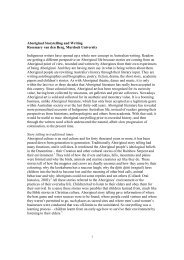Gallipoli, Kokoda and the Making of National Identity - [API] Network
Gallipoli, Kokoda and the Making of National Identity - [API] Network
Gallipoli, Kokoda and the Making of National Identity - [API] Network
Create successful ePaper yourself
Turn your PDF publications into a flip-book with our unique Google optimized e-Paper software.
Hank Nelson<br />
into service by <strong>the</strong> Japanese in Rabaul had been shipped to Rabaul to work for <strong>the</strong><br />
Japanese <strong>and</strong> some Papuans uncertain <strong>of</strong> what was happening <strong>and</strong> with no reason<br />
to be grateful to <strong>the</strong> Australians, sided with <strong>the</strong> Japanese. The early battles in <strong>the</strong><br />
<strong>Kokoda</strong> campaign were certainly significant for Papua New Guineans but <strong>the</strong> varied<br />
experiences <strong>and</strong> diverse motivations <strong>and</strong> responses defy reduction to a narrative to<br />
stir a nation. In Papua New Guinea Anzac Day, which is not a holiday, still evokes<br />
memories <strong>of</strong> war <strong>and</strong> perhaps <strong>of</strong> nationhood. But Remembrance Day, which is a<br />
holiday, touches few people. It has <strong>of</strong>ficial status but not popular sentiment. In<br />
1992 Anzac Day was a Saturday <strong>and</strong> <strong>the</strong>re were many people free to assemble.<br />
For Namaliu as he faced that crowd <strong>the</strong>re was <strong>the</strong> subtle problem <strong>of</strong> not resurrecting<br />
Anzac day as a national occasion for Papua New Guineans but at <strong>the</strong> same time<br />
recognising <strong>the</strong> importance <strong>of</strong> <strong>the</strong> war in <strong>the</strong> history <strong>of</strong> Papua New Guinea.<br />
While Namaliu undoubtedly saw <strong>the</strong> war as an extraordinary experience for<br />
most people <strong>of</strong> Papua New Guinea he did not stress its importance in <strong>the</strong> creation <strong>of</strong><br />
<strong>the</strong> nation <strong>of</strong> Papua New Guinea. Before <strong>the</strong> war much <strong>of</strong> <strong>the</strong> two territories <strong>of</strong><br />
Papua <strong>and</strong> New Guinea was lightly touched by <strong>the</strong> outside world but between 1942<br />
<strong>and</strong> 1945 perhaps 1,500,000 foreigners arrived <strong>and</strong> over 200,000 <strong>of</strong> <strong>the</strong>m died <strong>the</strong>re.<br />
More Papua New Guineans travelled, earned cash <strong>and</strong> suffered trauma than ever<br />
before <strong>and</strong> while <strong>the</strong>y were changed by <strong>the</strong> experience, it may be that in terms <strong>of</strong><br />
nation building <strong>the</strong> war had its greatest effect in its redirection <strong>of</strong> Australian policy<br />
towards Papua New Guinea. When real opportunities opened up for Papua New<br />
Guineans from <strong>the</strong> 1960s <strong>the</strong>n it was those who were children or unborn during <strong>the</strong><br />
war who moved into positions <strong>of</strong> power. The men <strong>of</strong> <strong>the</strong> wartime generation, with<br />
<strong>the</strong> partial exception <strong>of</strong> John Guise, were surpassed by <strong>the</strong> next generation: Somare,<br />
Chan, Namaliu, Wingti etc. To evoke <strong>the</strong> war in association with <strong>the</strong> new nation <strong>of</strong><br />
Papua New Guinea is to direct attention to <strong>the</strong> colonisers <strong>and</strong> to those Papua New<br />
Guineans who endured <strong>the</strong> taim bilong pait but who did not reap <strong>the</strong> reward. 4<br />
Namaliu could refer to momentous events in Papua New Guinea <strong>of</strong> fifty years<br />
ago but not <strong>the</strong> day. Warren Cooper <strong>of</strong> New Zeal<strong>and</strong> had <strong>the</strong> day but not <strong>the</strong><br />
events. He could speak confidently on <strong>the</strong> 77th anniversary <strong>of</strong> <strong>the</strong> l<strong>and</strong>ing at <strong>Gallipoli</strong><br />
but this was also <strong>the</strong> fiftieth anniversary <strong>of</strong> critical battles in <strong>the</strong> Pacific: Coral Sea,<br />
Midway, Milne Bay, <strong>Kokoda</strong> <strong>and</strong> Guadalcanal. They were obviously more relevant<br />
when he was in Port Moresby speaking to a crowd dominated by Papua New<br />
Guineans. In <strong>the</strong> critical days <strong>of</strong> 1942 when <strong>the</strong> Australians decided to bring <strong>the</strong>ir<br />
troops home across <strong>the</strong> Indian Ocean, <strong>the</strong> New Zeal<strong>and</strong>ers had chosen to leave<br />
<strong>the</strong>ir troops <strong>the</strong>re. The main New Zeal<strong>and</strong> commitment <strong>of</strong> ground troops, <strong>and</strong> <strong>the</strong><br />
main New Zeal<strong>and</strong> army deaths, continued to occur on <strong>the</strong> o<strong>the</strong>r side <strong>of</strong> <strong>the</strong> world.<br />
At <strong>the</strong> end <strong>of</strong> <strong>the</strong> war in Europe <strong>the</strong> New Zeal<strong>and</strong>ers were in north Italy. Alongside<br />
<strong>the</strong> 3,400 Australian dead at Bomana <strong>the</strong>re are just six New Zeal<strong>and</strong> airmen. One<br />
wonders what it would have done to New Zeal<strong>and</strong>ers’ perceptions <strong>of</strong> <strong>the</strong>mselves<br />
as a Pacific Isl<strong>and</strong> nation if in fact <strong>the</strong>y had fought through <strong>the</strong> Pacific campaign —<br />
if, say, <strong>the</strong> Maori battalion had fought its way to Wewak or Manila instead <strong>of</strong> to<br />
Trieste? Would <strong>the</strong>re now be a traffic <strong>of</strong> New Zeal<strong>and</strong>ers back to battlefields in<br />
Melanesia <strong>and</strong> sou<strong>the</strong>ast Asia, would New Zeal<strong>and</strong>ers be reminded in newspapers<br />
<strong>and</strong> film <strong>of</strong> <strong>the</strong>ir role in <strong>the</strong> region <strong>and</strong> would New Zeal<strong>and</strong>ers be more fixed on <strong>the</strong><br />
region to <strong>the</strong>ir nor<strong>the</strong>ast? In Port Moresby, Cooper could remind his listeners that<br />
<strong>the</strong> New Zeal<strong>and</strong>ers had taken part in <strong>the</strong> recapture <strong>of</strong> Nissan Isl<strong>and</strong> — but that<br />
150


![Gallipoli, Kokoda and the Making of National Identity - [API] Network](https://img.yumpu.com/31766380/3/500x640/gallipoli-kokoda-and-the-making-of-national-identity-api-network.jpg)
![Dream and Nightmare in William Gibson's ... - [API] Network](https://img.yumpu.com/49298598/1/184x260/dream-and-nightmare-in-william-gibsons-api-network.jpg?quality=85)

!['Fuck All Editors': The Ern Malley Affair and Gwen ... - [API] Network](https://img.yumpu.com/42446228/1/184x260/fuck-all-editors-the-ern-malley-affair-and-gwen-api-network.jpg?quality=85)
![Polona Petek - [API] Network](https://img.yumpu.com/40542952/1/190x245/polona-petek-api-network.jpg?quality=85)
![to download as a PDF. - [API] Network](https://img.yumpu.com/35170825/1/184x260/to-download-as-a-pdf-api-network.jpg?quality=85)
![Edward Koiki Mabo: The Journey to Native Title - [API] Network](https://img.yumpu.com/33197148/1/184x260/edward-koiki-mabo-the-journey-to-native-title-api-network.jpg?quality=85)
![Indigenous Knowledge and Pharmaceuticals - [API] Network](https://img.yumpu.com/24108846/1/184x260/indigenous-knowledge-and-pharmaceuticals-api-network.jpg?quality=85)
![Ferals: Terra-ism and Radical Ecologism in Australia - [API] Network](https://img.yumpu.com/13809010/1/184x260/ferals-terra-ism-and-radical-ecologism-in-australia-api-network.jpg?quality=85)
![Big Chief Little Wolf: Wrestling, Radio and Folklore in ... - [API] Network](https://img.yumpu.com/12204748/1/184x260/big-chief-little-wolf-wrestling-radio-and-folklore-in-api-network.jpg?quality=85)
![Dark Tourism and the Celebrity Prisoner - [API] Network](https://img.yumpu.com/4348795/1/184x260/dark-tourism-and-the-celebrity-prisoner-api-network.jpg?quality=85)